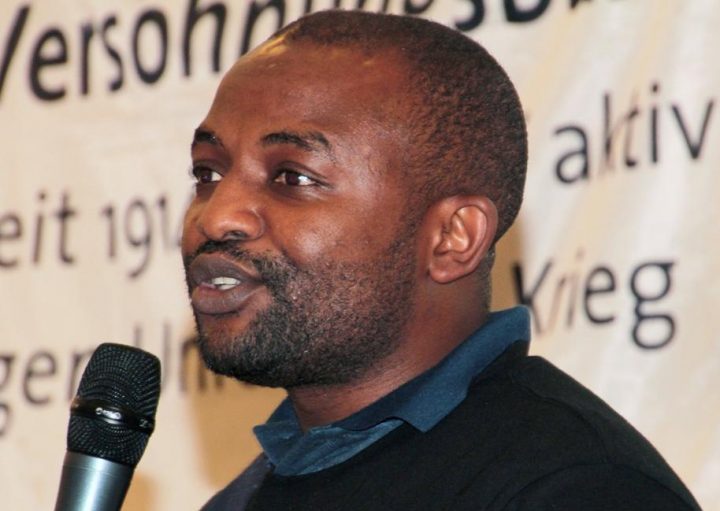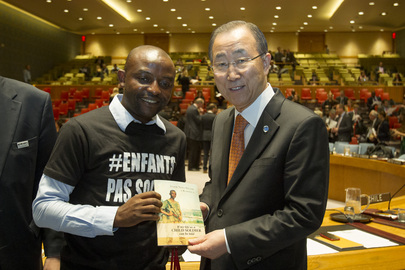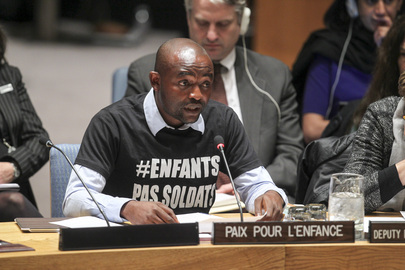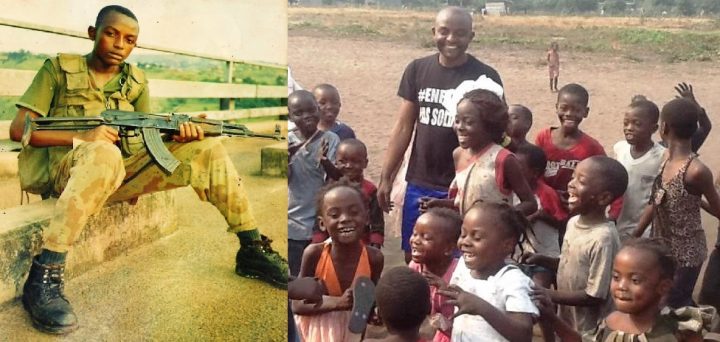The foundation „die schwelle“ in Bremen, Germany, has declared Junior Nzita to one of its laureates of the Bremen Peace Price. Nzita is a former child soldier in the Democratic Republic of Congo (DRC) and today he is a honorary UN ambassador for the topic of child soldiers. He was proposed for the Peace Prize by the german branch of the International Fellowship of Reconciliation (FOR). The Price exists since 2003 and is endowed with 5000,- Euro.
Junior Nzita was kidnapped at the age of twelve together with other classmates from his school and was forced by rebel groups, to participate in the civil wars of his country as a child soldier. From these times he is still traumatized tremendously and suffers from severe sleeping disorders. “Despite the endless painful experiences, Junior succeeds to find strength to give hope to others and to stand up in such engaged and courageous way for this issue”, says Samya Korff of the directorate of the FOR. Under a mandate of a UN program, Junior was demobilised in 2006. In 2010 he founded the organisation “Paix pour l’enfance“ (Peace for Childhood) in Kinshasa, the capital of DRC, in order to integrate children, who have become orphans because of the armed struggle, into new families and to offer them school education and a future perspective. Today he engages as a honorary ambassador of the United Nations for the worldwide abolition of the recruitment of children as soldiers. Because of these activities he had to leave his country in 2015 and apply for asylum.
On a lecture tour through Germany, Junior Nzita was invited to many schools and church communities. “It was fascinating to see how Junior got into conversation with young people and sensitised them for the impacts of arms export and wars”, says Samya Korff. “That’s why we are very happy about this award.”
Here is an interview, that we have done with Junior Nzita.
Pressenza: What does this award mean for you?
Junior Nzita: For me, this price means that the message that I try to transmit in the moment, is heard, about the atrocities against the child rights in general and especially the recruitment in the army and in armed groups. It is a great honor for me and the partners who support me. For the kind of work that I am doing, this price means also a great appreciation and it encourages me to go further and do even better. My childhood was stolen and I spent my whole youth to prevent that what had happened to me would happen to others, and that peace will prevail.
P.: You have been forced to be a soldier from the age of twelve to twenty two. What is it that remains in your soul from this time and how did you reconcile with what happened?
J.: I was kidnapped and forced at the age of twelve to join the army. I lived ten years through a martyrdom and what remains in my mind are the trauma of the evil treatment that I suffered. Very early they pulled me out of the hands of my teachers and family to teach me how to destroy the society. At the age of twelve I learned how to shoot, to rob and to kill, how to destroy wells and hospitals, schools, and nature… In order to reconcile in the face of all these atrocities, I had two possibilities. The first one: to continue living as a victim, which would have meant to take revenge with weapons, get caught by drugs or commit suicide, like many of my former comrades in the army have done. The second possibility was, despite all of these atrocities that I commited with the weapons they gave us, to forgive myself and understand that we were children who were forced by slaughterers, by adults. And to keep the hope for a better future in which we will talk about a world without child soldiers.
What is burned into my heart is the lesson that life has taught me: The human being is nothing more than an animal when he does not achieve his ambitious goals. Because of this inability he reaches a point when he does not regard the other as equal. One of the consequences is that he will abuse children as canon fodder in order to achieve his failed ambitions.
P.: You engage a lot in protecting other children to have the same destiny. What do you think could the UN or Germany or other stakeholders from outside do to prevent the abuse of children as soldiers? Or which effective measurements are done already?
J.: Our demobilisation was not easy. The intervention of the United Nations, the European Union, the civil society and the international community was needed for our governement to accept to demobilise us, to get us out of the army. Germany was one of the countries that financed the process of demobilisation and resocialisation. Currently the United Nations have launched an action plan in order to end the abuse of children as soldiers. Several countries have subscribed this plan but there remains a lot to do because the countries should not just ratify but also respect the agreements. That means to create a good diplomatic, economic and social atmosphere and to respect democracy, in order to prevent a coup d’etat or a rebellion. The United Nations and Germany must further support the formation and strengthening of democracy. They must develop mechanisms to prevent the sell of weapons to countries of the Third World where children are abused as canon fodder.
They can als contribute in preventing children to become victims of recruitment by putting pressure on political decision makers, industrialized countries and heads of certain multinational companies that are inflicted in one or the other way in financing wars – wars that in different ways facilitate the organised deprivation of ressources of underdeveloped countries. Especially I want to mention the following options: The prohibition of the purchase of metals from countries in war; pressure on political decision makers and civil society to build up a government system in which the population participates in important decisions like how to distribute the ressources in order to improve their well being; all authorities and persons who are involved in the recruitment of children in armed groups, should be brought to justice in front of the International Criminal Court.
P.: How is the situation today in DRC?
J.: There is a political crisis and the tensions are growing day after day because of lack of respect for the election procedure. In this situation several armed groups are formed. Unfortunately it is the children and women who are paying the price. The children because they become abducted and the women are raped.
The situation today in DRC is comparable to a man who plunges himself into the Nothing…like a train that goes into one direction and suddenly the ones who are responsible for the maintenance of the rails decide to remove them for the rest of the track while the train is accelerating. Imagine the consequences!
P.: Where do you take your strength from?
J.: Until today I see before me the Junior of twelve years who was kidnapped, because there are still child soldiers. When I was abducted there was a comrade who, before he died, asked me to take care of his child. All this gave me strength and courage to build up the NGO “Paix pour l’enfance” where 140 children are given education and protection. My work and the support of the children is a possibility for me to show the love to the twelve year old Junior and to protect him from the war desasters that he lived through.
It is the “dictatorship” of love that commands me to defeat the evil with the good and never become tired to plant the seeds of love into the hearts of my fellow human beings, who destiny is making to cross my way, for them to perceive the fruits of love in their inner self and bring them to others.
Translation of the interview french to german Caroline Schenck.













